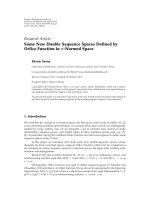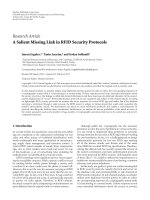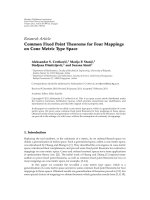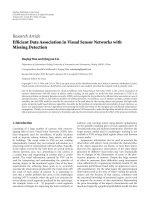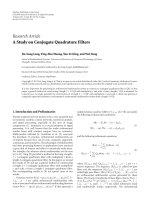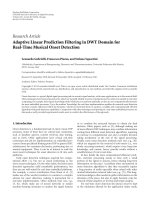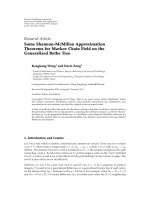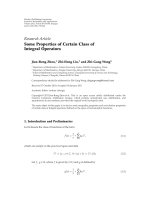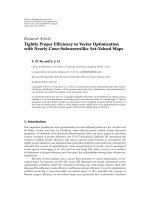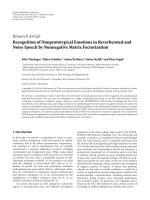Báo cáo hóa học: " Research Article Some Maximal Elements’ Theorems in FC-Spaces" docx
Bạn đang xem bản rút gọn của tài liệu. Xem và tải ngay bản đầy đủ của tài liệu tại đây (517.77 KB, 12 trang )
Hindawi Publishing Corporation
Journal of Inequalities and Applications
Volume 2009, Article ID 905605, 12 pages
doi:10.1155/2009/905605
Research Article
Some Maximal Elements’ Theorems in FC-Spaces
Rong-Hua He
1, 2
and Yong Zhang
1
1
Department of Mathematics, Chengdu University of Information Technology,
Chengdu, Sichuan 610103, China
2
Department of Mathematics, Sichuan University, Chengdu, Sichuan 610064, China
Correspondence should be addressed to Rong-Hua He,
Received 30 March 2009; Accepted 1 September 2009
Recommended by Nikolaos Papageorgiou
Let I be a finite or infinite index set, let X be a topological space, and let Y
i
,ϕ
N
i
i∈I
be a family of
FC-spaces. For each i ∈ I,letA
i
: X → 2
Y
i
be a set-valued mapping. Some new existence theorems
of maximal elements for a set-valued mapping and a family of set-valued mappings involving a
better admissible set-valued mapping are established under noncompact setting of FC-spaces. Our
results improve and generalize some recent results.
Copyright q 2009 R H. He and Y. Zhang. This is an open access article distributed under the
Creative Commons Attribution License, which permits unrestricted use, distribution, and
reproduction in any medium, provided the original work is properly cited.
1. Introduction
It is well known that many existence theorems of maximal elements for various classes
of set-valued mappings have been established in different spaces. For their applications to
mathematical economies, generalized games, and other branches of mathematics, the reader
may consult 1–12 and the references therein.
In most of the known existence results of maximal elements, the convexity
assumptions play a crucial role which strictly restrict the applicable area of these results.
In this paper, we will continue to study existence theorems of maximal elements in general
topological spaces without convexity structure. We introduce a new class of generalized
G
B
-majorized mappings A
i
: X → 2
Y
i
for each i ∈ I which involve a set-valued
mapping F ∈BY, X. The notion of generalized G
B
-majorized mappings unifies and
generalizes the corresponding notions of G
B
-majorized mappings in 4; L
S
-majorized
mappings in 2, 13; H-majorized mappings in 14. Some new existence theorems of
maximal elements for generalized G
B
-majorized mappings are proved under noncompact
setting of FC-spaces. Our results improve and generalize the corresponding results in
2, 4, 14–16.
2 Journal of Inequalities and Applications
2. Preliminaries
Let X and Y be two nonempty sets. We denote by 2
Y
and X the family of all subsets of
Y and the family of all nonempty finite subsets of X, respectively. For each A ∈X,we
denote by |A| the cardinality of A.LetΔ
n
denote the standard n-dimensional simplex with
the vertices {e
0
, ,e
n
}.IfJ is a nonempty subset of {0, 1, ,n}, we will denote by Δ
J
the
convex hull of t he vertices {e
j
: j ∈ J}.
Let X and Y be two sets, and let T : X → 2
Y
be a set-valued mapping. We will use the
following notations in t he sequel:
i Tx{y ∈ Y : y ∈ Tx},
ii TA
x∈A
Tx,
iii T
−1
y{x ∈ X : y ∈ Tx}.
For topological spaces X and Y ,asubsetA of X is said to be compactly open resp.,
compactly closed if for each nonempty compact subset K of X, A∩K is open resp., closed in
K. The compact closure of A and the compact interior of A see 17 are defined, respectively,
by
ccl A
B ⊂ X : A ⊂ B, B is compactly closed in X
,
cint A
B ⊂ X : B ⊂ A, B is compactly open in X
.
2.1
It is easy to see that cclX \ AX \ cint A, int A
⊂ cint A ⊂ A, A ⊂ ccl A ⊂ clA, A is
compactly open resp., compactly closed in X if and only if A cint A resp., A ccl A. For
each nonempty compact subset K of X, ccl A
K cl
K
A
K and cint A
K int
K
A
K,
where cl
K
A
Kresp., int
K
A
K denotes the closure resp., interior of A
K in K.A
set-valued mapping T : X → 2
Y
is transfer compactly open valued on X see 17 if for
each x ∈ X and y ∈ Tx, there exists x
∈ X such that y ∈ cint Tx
.LetA
i
i 1, ,m be
transfer compactly open valued, then
m
i1
cint A
i
cint
m
i1
A
i
. It is clear that each transfer
open valued correspondence is transfer compactly open valued. The inverse is not true in
general.
The definition of FC-space and the class BY, X of better admissible mapping were
introduced by Ding in 8. Note that the class BY, X of better admissible mapping includes
many important classes of mappings, for example, the class BY, X in 18, U
k
c
Y, X in 19
and so on as proper subclasses. Now we introduce the following definition.
Definition 2.1. An FC-space Y, ϕ
N
is said to be an CFC-space if for each N ∈Y , there
exists a compact FC-subspace L
N
of Y containing N.
Y, ϕ
N
be a G-convex space, let the notion of CG-convex space was introduced by
Ding in 4.
Lemma 2.2 8. Let I be any index set. For each i ∈ I,letY
i
,ϕ
N
i
be an FC-space, Y
i∈I
Y
i
and ϕ
N
i∈I
ϕ
N
i
.ThenY, ϕ
N
is also an FC-space.
Let X be a topological space, and let I be any index set. For each i ∈ I,letY
i
,ϕ
N
i
i∈I
be an FC-space, and let Y
i∈I
Y
i
such that Y, ϕ
N
is an FC-space defined as in Lemma 2.2.
Journal of Inequalities and Applications 3
Let F ∈BY, X and for each i ∈ I,letA
i
: X → 2
Y
i
be a set-valued mapping. For each i ∈ I,
1 A
i
: X → 2
Y
i
is said to be a generalized G
B
-mapping if
a for each N {y
0
, ,y
n
}∈Y and {y
i
0
, ,y
i
k
}⊂N, Fϕ
N
Δ
k
k
j0
cint A
−1
i
π
i
y
i
j
∅, where π
i
is the projection of Y onto Y
i
and
Δ
k
co{e
i
j
: j 0, ,k};
b A
−1
i
y
i
{x ∈ X : y
i
∈ A
i
x} is transfer compactly open in Y
i
for each y
i
∈ Y
i
;
2 A
x,i
: X → 2
Y
i
is said to be a generalized G
B
-majorant of A
i
at x ∈ X if A
x,i
is a
generalized G
B
-mapping and there exists an open neighborhood Nx of x in X
such that A
i
z ⊂ A
x,i
z for all z ∈ Nx;
3 A
i
is said to be a generalized G
B
-majorized if for each x ∈ X with A
i
x
/
∅, there
exists a generalized G
B
-majorant A
x,i
of A
i
at x, and for any N ∈{x ∈ X :
A
i
x
/
∅}, the mapping
x∈N
A
−1
x,i
is transfer compactly open in Y
i
;
4 A
i
is said to be a generalized G
B
-majorized if for each x ∈ X, there exists a
generalized G
B
-majorant A
x,i
of A
i
at x.
Then {A
i
}
i∈I
is said to be a family of generalized G
B
-mappings resp., G
B
-majorant
mappings if for each i ∈ I, A
i
: X → 2
Y
i
is a generalized G
B
-mapping resp., G
B
-majorant
mapping.
If for each i ∈ I,letY
i
,ϕ
N
i
be a G-convex space, a family of G
B
-mappings resp., G
B
-
majorant mappings were introduced by Ding in 4. Clearly, each family of generalized G
B
-
mappings must be a family of generalized G
B
-majorant mappings. If F S is a single-valued
mapping and A
i
x is an FC-subspace of Y
i
for each x ∈ X, then condition y
i
/
∈ A
i
Sy for
each y ∈ Y implies that condition a in 1 holds. Indeed, if a is false, then there exist N
{y
0
, ,y
n
}∈Y , {y
i
0
, ,y
i
k
}⊆N,andy ∈ ϕ
N
Δ
k
such that FySy ∈
k
j0
A
−1
i
π
i
y
i
j
and hence π
i
y
i
j
∈ A
i
Sy for each j 0, ,k. It follows from y ∈ ϕ
N
Δ
k
that π
i
y ∈
ϕ
N
i
Δ
k
where N
i
π
i
N. It follows from A
i
Sy being an FC-subspace of Y
i
that π
i
y ∈
ϕ
N
i
Δ
k
⊂ A
i
Sy which contradicts condition y
i
/
∈ A
i
Sy for each y ∈ Y . Hence each
L
S
-mapping resp., L
S
-majorant mapping introduced by Deguire et al. see 2, page 934
must be a generalized G
B
-mapping resp., G
B
-majorant mapping. The inverse is not true in
general.
3. Maximal Elements
In order to obtain our main results, we need the following lemmas.
Lemma 3.1 3. Let X and Y be topological spaces, let K be a nonempty compact subset of X, and
let G : X → 2
Y
be a set-valued mapping such that Gx
/
∅ for each x ∈ K. Then the following
conditions are equivalent:
1 G have the compactly local intersection property;
2 for each y ∈ Y, there exists an open subset O
y
of X (which may be empty) such that
O
y
K ⊂ G
−1
y and K
y∈Y
O
y
K;
3 there exists a set-valued mapping F : X → 2
Y
such that for each y ∈ Y, F
−1
y is open or
empty in X, F
−1
y
K ⊂ G
−1
y, ∀y ∈ Y, and K
y∈Y
F
−1
y
K;
4 Journal of Inequalities and Applications
4 for each x ∈ K,thereexistsy ∈ Y such that x ∈ cint G
−1
y
K and K
y∈Y
cint G
−1
y
K
y∈Y
G
−1
y
K;
5 G
−1
: Y → 2
X
is transfer compactly open valued on Y .
Lemma 3.2 8. Let X be a topological space, and let Y, ϕ
N
be an FC-space, F ∈BY, X and
A : X → 2
Y
such that
i for each N {y
0
, ,y
n
}∈Y and for each {y
i
0
, ,y
i
k
}⊆N,
F
ϕ
N
Δ
k
⎛
⎝
k
j0
cint A
−1
y
i
j
⎞
⎠
∅, 3.1
ii A
−1
: Y → 2
X
is transfer compactly open valued;
iii there exists a nonempty set Y
0
⊂ Y and for each N {y
0
, ,y
n
}∈Y,thereexistsa
compact FC-subspace L
N
of Y containing Y
0
∪ N such that K
y∈Y
0
cint A
−1
y
c
is
empty or compact in X,wherecint A
−1
y
c
denotes the complement of cint A
−1
y.
Then there exists a point x ∈ X such that Ax∅.
Theorem 3.3. Let X be a topological space, let K be a nonempty compact subset of X, and let Y, ϕ
N
be an FC-space, F ∈BY, X and A : X → 2
Y
be a generalized G
B
-mapping such that
i for each N {y
0
, ,y
n
}∈Y , there exists a compact FC-subspace L
N
of Y containing
N such that for each x ∈ X \ K, L
N
cint Ax
/
∅.
Then there exists a point x ∈ K such that A x∅.
Proof. Suppose that Ax
/
∅ for each x ∈ X. Since A is a generalized G
B
-mapping, A
−1
is
transfer compactly open valued. By Lemma 3.1, we have
K
y∈Y
cint A
−1
y
K
.
3.2
Since K is compact, there exists a finite set N {y
o
, ,y
n
}∈Y such that
K
n
i0
cint A
−1
y
i
K
.
3.3
By condition i and F ∈BY, X, there exists a compact FC-subspace L
N
of Y containing N
and FL
N
is compact in X, and hence we have
F
L
N
y∈L
N
cint A
−1
y
F
L
N
.
3.4
By using similar argument as in the proof of Lemma 3.2, we can show that there exists x ∈ X
such that A x∅. Condition i implies that x must be in K. This completes the proof.
Journal of Inequalities and Applications 5
Remark 3.4. Theorem 3.3 generalizes in 4, Theorem 2.2 in the following several aspects:
a from G-convex space to FC-space without linear structure; b from G
B
-mappings to
generalized G
B
-mappings.
Theorem 3.5. Let X be a topological space, and let Y, ϕ
N
be an FC-space. Let F ∈BY, X and
A : X → 2
Y
be a generalized G
B
-majorized mapping such that
i there exists a paracompact subset E of X such that {x ∈ X : Ax
/
∅} ⊂ E;
ii there exists a nonempty set Y
0
⊂ Y and for each N {y
0
, ,y
n
}∈Y,there
exists a compact FC-subspace L
N
of Y containing Y
0
∪ N such that the set K
y∈Y
0
cint A
−1
y
c
is empty or compact.
Then there exists a point x ∈ X such that A x∅.
Proof. Suppose that Ax
/
∅ for each x ∈ X. Since A is a generalized G
B
-majorized, for each
x ∈ X, there exists an open neighborhood Nx of x in X and a generalized G
B
-mapping
A
x
: X → 2
Y
such that
a Az ⊂ A
x
z for each z ∈ Nx,
b for each N {y
0
, ,y
n
}∈Y and {y
i
0
, ,y
i
k
}⊆N, Fϕ
N
Δ
k
k
j0
cint A
−1
x
y
i
j
∅,
c A
−1
x
is transfer compactly open in Y ,
d for any N ∈{x ∈ X : Ax
/
∅}, the mapping
x∈N
A
−1
x
is transfer compactly open
in X.
Since Ax
/
∅ for each x ∈ X, it follows from condition i that X {x ∈ X : Ax
/
∅} E is
paracompact. By Dugundji in 20, Theorem VIII.1.4, the open covering {Nx : x ∈ X} has
an open precise locally finite refinement {Ox : x ∈ X}, and for each x ∈ X,
Ox ⊂ Nx
since X is normal. For each x ∈ X, define a mapping B
x
: X → 2
Y
by
B
x
z
⎧
⎨
⎩
A
x
z
, if z ∈
Ox,
Y, if z ∈ X \
Ox.
3.5
Then for each y ∈ Y , we have
B
−1
x
y
z ∈
Ox : y ∈ A
x
z
z ∈ X \
Ox : y ∈ Y
A
−1
x
y
Ox
X \
Ox
A
−1
x
y
X \
O
x
O
x
X \
O
x
A
−1
x
y
X \
O
x
.
3.6
Hence B
−1
x
y is transfer compactly open in Y by c.
Now define a mapping B : X → 2
Y
by
B
z
x∈X
B
x
z
, ∀z ∈ X.
3.7
6 Journal of Inequalities and Applications
We claim that B is a generalized G
B
-mapping and Az ⊂ Bz for each z ∈ X. Indeed, for
any nonempty compact subset C of X and each y ∈ Y with B
−1
y ∩ C
/
∅, we may take any
fixed u ∈ B
−1
y ∩ C. Since {Ox : x ∈ X} is locally finite, there exists an open neighborhood
V
u
of u in X such that {x ∈ X : V
u
∩ Ox
/
∅} {x
1
, ,x
n
} is a finite set. If x
/
∈{x
1
, ,x
n
},
then ∅ V
u
∩ OxV
u
∩ Ox, and hence B
x
zY for all z ∈ V
u
which implies that
Bz
x∈X
B
x
z
n
i1
B
x
i
z for all z ∈ V
u
. It follows that for each y ∈ Y,
B
−1
y
z ∈ X : y ∈ B
z
⊃
z ∈ V
u
: y ∈ B
z
z ∈ V
u
: y ∈
n
i1
B
x
i
z
V
u
n
i1
B
−1
x
i
y
.
3.8
For any nonempty compact subset C of X and each y ∈ Y ,ifv ∈ V
u
∩
n
i1
B
−1
x
i
y
C ⊂
B
−1
y
C. Since V
u
is open in X, it follows from d that there exists y
∈ Y such that
v ∈ V
u
cint
n
i1
B
−1
x
i
y
C cint
V
u
n
i1
B
−1
x
i
y
C
cint B
−1
y
C.
3.9
This proves that B
−1
: Y → 2
X
is transfer compactly open valued in Y .
On the other hand, for each N {y
0
, ,y
n
}∈Y and N
1
{y
i
0
, ,y
i
k
}⊆N,ift ∈
k
j0
cint B
−1
y
i
j
, then N
1
⊂ cint Bt. Since there exists x
0
∈ X such that t ∈ Ox
0
and N
1
⊂
cint Bt ⊂ cint B
x
0
tcint A
x
0
t, we have t ∈
k
j0
cint A
−1
x
0
y
i
j
, and hence t
/
∈ Fϕ
N
Δ
k
by
b. Hence we have
F
ϕ
N
Δ
k
⎛
⎝
k
j0
cint B
−1
y
i
j
⎞
⎠
∅ 3.10
for each N {y
0
, ,y
n
}∈Y and N
1
{y
i
0
, ,y
i
k
}⊆N. This shows that B is a
generalized G
B
-mapping.
For each z ∈ X,ify
/
∈ Bz, then there exists an x
0
∈ X such that y
/
∈ B
x
0
zA
x
0
z
and z ∈
Ox
0
⊂ Nx
0
. It follows from a that y
/
∈ Az. Hence we have Az ⊂ Bz
for each z ∈ X. By condition ii, there exists a nonempty set Y
0
⊂ Y and for each N
{y
0
, ,y
n
}∈Y, there exists a compact FC-subspace L
N
of Y containing Y
0
∪ N such that
the set K
y∈Y
0
cint A
−1
y
c
is empty or compact. Note that Az ⊂ Bz for each z ∈ X
implies cint B
−1
y
c
⊂ cint A
−1
y
c
for each y ∈ Y . Hence K
y∈Y
0
cint B
−1
y
c
⊂ K
and K
is empty or compact. By Lemma 3.2, there exists a point x ∈ X such that Bx∅,and
hence A
x∅ which contradicts the assumption that Ax
/
∅ for each x ∈ X. Therefore,
there exists x ∈ X such that A x∅.
Journal of Inequalities and Applications 7
Theorem 3.6. Let X be a topological space, let K be a nonempty compact subset of X and Y, ϕ
N
be
an FC-space. Let F ∈BY, X and A : X → 2
Y
be a generalized G
B
-majorized mapping such that
i there exists a paracompact subset E of X such that {x ∈ X : Ax
/
∅} ⊂ E;
ii for each N {y
0
, ,y
n
}∈Y , there exists a compact FC-subspace L
N
of Y containing
N such that for each x ∈ X \ K, L
N
cint Ax
/
∅.
Then there exists x ∈ K such that A x∅.
Proof. Suppose that Ax
/
∅ for each x ∈ X. By using similar argument as in the proof of
Theorem 3.5, we can show that there exists a generalized G
B
-mapping B : X → 2
Y
such that
Ax ⊂ Bx for each x ∈ X. It follows from condition ii that for each x ∈ X \ K, L
N
∩
cint Bx
/
∅.ByTheorem 3.3, there exists
x ∈ K such that Bx∅, and hence Ax∅
which contradicts the assumption that Ax
/
∅ for each x ∈ X. Therefore, there exists x ∈ X
such that A x∅. Condition ii implies x ∈ K. This completes the proof.
Remark 3.7. Theorem 3.5 generalizes 4, Theorem 2.3 in several aspects: Section 11 from
G-convex space to FC-space without linear structure; Section 12 from a G
B
-majorized
mapping to a generalized G
B
-majorized mapping; Section 13 condition ii of Theorem 3.5
is weaker than condition ii of 4, Theorem 2.3.IfX is compact, condition i is satisfied
trivially. If X Y, ϕ
N
is a compact FC-space, then by letting K X Y L
N
for
all N ∈X, conditions i and ii are satisfied automatically. Theorem 3.6 unifies and
generalizes Shen’s 14, Theorem 2.1, Corollary 2.2 and Theorem 2.3 in the following ways:
Section 21 from CH-convex space to FC-space without linear structure; Section 22 from
H-majorized correspondences to generalized G
B
-majorized mapping; Section 23 condition
ii of Theorem 3.6 is weaker than that in the corresponding results of Shen in 14.
Theorem 3.6 also generalizes in 4, Theorem 2.4,Dingin15, Theorem 5.3, and Ding and
Yuan in 16, Theorem 2.3 in several aspects.
Corollary 3.8. Let X be a compact topological space, and let Y, ϕ
N
be an CFC-space. Let F ∈
BY, X and A : X → 2
Y
be a generalized G
B
-majorized mapping. Then there exists a point x ∈ X
such that A x∅.
Proof. The conclusion of Corollary 3.8 follows from Theorem 3.6 with E K X.
Corollary 3.9. Let X be a topological space, and let Y, ϕ
N
be an CFC-space. Let F ∈BY, X be a
compact mapping and A : X → 2
Y
be a generalized G
B
-majorized mapping. Then there exists a point
x ∈ X such that Ax∅.
Proof. Since F is a compact mapping, there exists a compact subset X
0
of X such that FY ⊂
X
0
. The mapping A|
X
0
: X
0
→ 2
Y
be the restriction of A to X
0
. It is easy to see that A|
X
0
is also
generalized G
B
-majorized. By Corollary 3.8, there exists x ∈ X
0
such that A|
X
0
xA x
∅.
Remark 3.10. Corollary 3.8 generalizes Deguire et al. 2, Theorem 1 in the following ways:
1.1 from a convex subset of Hausdorff topological vector space to an FC-space without
linear structure; 1.2 from a L
S
-majorized mapping to a generalized G
B
-majorized mapping.
Corollary 3.8 also generalizes 4, Corollary 2.3 from CG-convex space to CFC-space
and from a G
B
-majorized mapping to a generalized G
B
-majorized mapping. Corollary 3.9
generalizes 2, Theorem 2 and 4, Corollary 2.4 in several aspects.
8 Journal of Inequalities and Applications
Theorem 3.11. Let X be a topological space, and let I be any index set. For each i ∈ I,letY
i
,ϕ
N
i
be an FC-space, and let Y
i∈I
Y
i
such that Y, ϕ
N
is an FC-space defined as in Lemma 2.2.Let
F ∈BY, X such that for each i ∈ I,
i let A
i
: X → 2
Y
i
be a generalized G
B
-majorized mapping;
ii
i∈I
{x ∈ X : A
i
x
/
∅}
i∈I
cint{x ∈ X : A
i
x
/
∅};
iii there exists a paracompact subset E
i
of X such that {x ∈ X : A
i
x
/
∅} ⊂ E
i
;
iv there exists a nonempty set Y
0
⊂ Y and for each N {y
0
, ,y
n
}∈Y,thereexistsa
compact FC-subspace L
N
of Y containing Y
0
N such that the set
y∈Y
0
ccl{x ∈ X : ∃i ∈
Ix,π
i
y
/
∈ A
i
x} is empty or compact, where Ix{i ∈ I : A
i
x
/
∅}.
Then there exists x ∈ X such that A
i
x∅ for each i ∈ I.
Proof. For each x ∈ X, Ix{i ∈ I : A
i
x
/
∅}. Define A : X → 2
Y
by
A
x
⎧
⎪
⎨
⎪
⎩
i∈Ix
π
−1
i
A
i
x
, if I
x
/
∅,
∅, if I
x
∅.
3.11
Then for each x ∈ X, Ax
/
∅ if and only if Ix
/
∅.Letx ∈ X with Ax
/
∅, then there exists
j
0
∈ Ix such that A
j
0
x
/
∅. By condition ii, there exists i
0
∈ Ix such that x ∈ cint{x ∈ X :
A
i
0
x
/
∅}. Since A
i
0
is generalized G
B
-majorized, there exist an open neighborhood Nx of
x in X and a generalized G
B
-majorant A
x,i
0
of A
i
0
at x such that
a A
i
0
z ⊂ A
x,i
0
z for all z ∈ Nx,
b for each N {y
0
, ,y
n
}∈Y and {y
r
0
, ,y
r
k
}⊂N,
F
ϕ
N
Δ
k
⎛
⎝
k
j0
cint A
−1
x,i
0
π
i
0
y
r
j
⎞
⎠
∅, 3.12
c A
−1
x,i
0
: Y
i
→ 2
X
is transfer compactly open in Y
i
,
d for each N ∈{x ∈ X : A
i
0
x
/
∅}, the mapping
x∈N
A
−1
x,i
0
is transfer compactly
open in Y
i
.
Without loss of generality, we can assume that Nx ⊂ cint{x ∈ X : A
i
0
x
/
∅}. Hence,
A
i
0
z
/
∅ for each z ∈ Nx. Define B
x,i
0
: X → 2
Y
by
B
x,i
0
z
π
−1
i
0
A
x,i
0
z
, ∀z ∈ X.
3.13
We claim that B
x,i
0
is a generalized G
B
-majorant of A at x. Indeed, we have
a
for each z ∈ Nx, Az
i∈Iz
π
−1
i
A
i
z ⊂ π
−1
i
0
A
i
0
z ⊂ π
−1
i
0
A
x,i
0
z
B
x,i
0
z,
Journal of Inequalities and Applications 9
b
for each N {y
0
, ,y
n
}∈Y and M {y
r
0
, ,y
r
k
}⊂N,ifu ∈
k
j0
cint B
−1
x,i
0
π
i
0
y
r
j
, then M ⊂ cintB
x,i
0
u. It is easy to see that π
i
0
M ⊂
cint π
i
0
B
x,i
0
u,sothatπ
i
0
M ⊂ cint A
x,i
0
u, i.e., u ∈
k
j0
cint A
−1
x,i
0
π
i
0
y
r
j
and
hence u
/
∈ Fϕ
N
Δ
k
by b. It follows that
F
ϕ
N
Δ
k
⎛
⎝
k
j0
cint B
−1
x,i
0
π
i
0
y
r
j
⎞
⎠
∅, 3.14
c
for each y ∈ Y, we have that
B
−1
x,i
0
y
A
−1
x,i
0
π
i
0
y
3.15
is transfer compactly open in Y by c.
Hence B
x,i
0
is a generalized G
B
-majorant of A at x.
For each N ∈{x ∈ X : A
i
0
x
/
∅} and y ∈ Y ,by3.15, we have
x∈N
B
−1
x,i
0
y
x∈N
A
−1
x,i
0
π
i
0
y
.
3.16
It follows from d that
x∈N
B
−1
x,i
0
is transfer compactly open in Y .
Hence A : X → 2
Y
is generalized G
B
-majorized. By condition iii, we have
{
x ∈ X : A
x
/
∅
}
⊂
{
x ∈ X : A
i
0
x
/
∅
}
⊂ E
i
0
. 3.17
By condition iv, there exists a nonempty set Y
0
⊂ Y and for each N {y
0
, ,y
n
}∈Y,
there exists a compact FC-subspace L
N
of Y containing Y
0
N. By the definition of A,for
each y ∈ Y
0
, we have
A
−1
y
x ∈ X : y ∈ A
x
⎧
⎨
⎩
x ∈ X : y ∈
i∈Ix
π
−1
i
A
i
x
⎫
⎬
⎭
⎧
⎨
⎩
x ∈ X : π
i
y
∈
i∈Ix
A
i
x
⎫
⎬
⎭
.
3.18
It follows from condition iv that K
y∈Y
0
cint A
−1
y
c
y∈Y
0
ccl{x ∈ X : ∃i ∈
Ix,π
i
y
/
∈ A
i
x} is empty or compact and hence all conditions of Theorem 3.5 are satisfied.
By Theorem 3.5, there exists x ∈ X such that Ax∅ which implies Ix∅,thatis,
A
i
x∅ for each i ∈ I.
10 Journal of Inequalities and Applications
Theorem 3.12. Let X be a topological space, and let I be any index set. For each i ∈ I,letY
i
,ϕ
N
i
be
an CFC-space, and let Y
i∈I
Y
i
.LetF ∈By, x be a compact mapping such that for each i ∈ I,
i let A
i
: X → 2
Y
i
be a generalized G
B
-majorized mapping;
ii
i∈I
{x ∈ X : A
i
x
/
∅}
i∈I
cint{x ∈ X : A
i
x
/
∅}.
Then there exists x ∈ X such that A
i
x∅ for each i ∈ I.
Proof. Since for each i ∈ I,letY
i
,ϕ
N
i
be an CFC-space, then for each N
i
∈Y
i
, there exists
a compact FC-subspace L
N
i
of Y
i
containing N
i
.LetL
N
i∈I
L
N
i
and N
i∈I
N
i
∈Y ,
then L
N
is a compact FC-subspace of Y for each N ∈Y , L
N
is a compact FC-subspace of Y
containing N. Hence Y, ϕ
N
is also an CFC-space.
For each x ∈ X, Ix{i ∈ I : A
i
x
/
∅}. Define A : X → 2
Y
A
x
⎧
⎪
⎨
⎪
⎩
i∈Ix
π
−1
i
A
i
x
, if I
x
/
∅,
∅, if I
x
∅.
3.19
Then for each x ∈ X, Ax
/
∅ if and only if Ix
/
∅. By using similar argument as in the proof
of Theorem 3.11, we can show that A : X → 2
Y
is a generalized G
B
-majorized mapping.
By Corollary 3.9, there exists x ∈ X such that Ax∅,andsoIx∅. Hence, we have
A
i
x∅ for each i ∈ I.
Theorem 3.13. Let X be a topological space, let K be a nonempty compact subset of X, and let I be
any index set. For each i ∈ I,letY
i
,ϕ
N
i
be an FC-space, and let Y
i∈I
Y
i
such that Y, ϕ
N
is
an FC-space defined as in Lemma 2.2.LetF ∈BY, X such that for each i ∈ I, A
i
: X → 2
Y
i
be a
generalized G
B
-mapping such that
i for each i ∈ I and N
i
∈Y
i
, there exists a compact FC-subspace L
N
i
of Y
i
containing N
i
and for each x ∈ X \ K,thereexistsi ∈ I satisfying L
N
i
cint A
i
x
/
∅.
Then there exists x ∈ K such that A
i
x∅ for each i ∈ I.
Proof. Suppose that the conclusion is not true, then for each x ∈ K, there exists i ∈ I such that
A
i
x
/
∅. Since A
i
is a generalized G
B
-mapping, A
−1
i
is transfer compactly open valued. By
Lemma 3.1, we have
K ⊂
i∈I
y
i
∈Y
i
cint A
−1
i
y
i
.
3.20
Since K is compact, there exists a finite set J ⊂ I such that for each j ∈ J, there exists N
j
{y
1
j
,y
2
j
, ,y
m
j
j
}⊂Y
j
with K ⊂
j∈J
m
j
k1
cint A
−1
j
y
k
j
. It follows that for each x ∈ K, there
exists a j ∈ J ⊂ I such that N
j
cint A
j
x
/
∅. We may take any fixed y
0
y
0
i
i∈I
∈ Y . For
each i ∈ I \J,letN
i
{y
0
i
}. By condition i, for each i ∈ I, there exists a compact FC-subspace
L
N
i
of Y
i
containing N
i
and for each x ∈ X \K, there exists i ∈ I satisfying L
N
i
cint A
i
x
/
∅.
Hence for each x ∈ X, there exists i ∈ I such that L
N
i
cint A
i
x
/
∅.LetL
N
i∈I
L
N
i
, then
L
N
is a compact FC-subspace of Y and hence it is also a compact CFC-space. Let X
0
FL
N
,
Journal of Inequalities and Applications 11
then X
0
is compact in X. Define A
i
: X
0
→ 2
L
N
i
by A
i
xL
N
i
A
i
x. For each y
i
∈ L
N
i
,we
have
A
i
−1
y
i
x ∈ X
0
: y
i
∈ L
N
i
A
i
x
X
0
A
−1
i
y
i
. 3.21
Since A
−1
i
y
i
is transfer compactly open valued in Y
i
for each i ∈ I and y
i
∈ Y
i
,sothat
we claim that A
i
−1
y
i
is transfer open valued in L
N
i
. Noting that each A
i
is a generalized
G
B
-mapping, for each M {y
0
, ,y
m
}∈L
N
⊂Y and M
1
{y
r
0
, ,y
r
k
}⊂M, we have
F
ϕ
M
Δ
k
⎛
⎝
k
j0
cint
A
i
−1
π
i
y
r
j
⎞
⎠
F
ϕ
M
Δ
k
⎛
⎝
k
j0
cint
X
0
A
−1
i
π
i
y
r
j
⎞
⎠
⊂ F
ϕ
M
Δ
k
⎛
⎝
k
j0
cint A
−1
i
π
i
y
r
j
⎞
⎠
∅,
3.22
where Δ
k
co{e
i
j
: j 0, ,k}.
Hence for each i ∈ I, A
i
is a generalized G
B
-mapping and hence it is also a generalized
G
B
-majorized mapping. All conditions of Corollary 3.8 are satisfied. By Corollary 3.8, there
exists
x ∈ X
0
⊂ X such that A
i
xL
N
i
A
i
x∅ for each i ∈ I, so we have
L
N
i
cint A
i
x ⊂ L
N
i
A
i
xA
i
x∅ which contradicts the fact that for each x ∈ X \ K
there exists i ∈ I such that L
N
i
cint A
i
x
/
∅. Therefore, there exists x ∈ K such that
A
i
x∅ for each i ∈ I.
Remark 3.14. Theorem 3.11 generalizes 4, Theorem 2.5 in several aspects. Theorem 3.12
improves 2, Theorem 3 from convex subsets of topological vector spaces to CFC-spaces
without linear structure and from a family of L
S
-majorized mappings to the family of
generalized G
B
-majorized mappings. Theorem 3.13 generalizes 4, Theorem 2.6 in several
aspects: 1.1 from G-convex spaces to FC-spaces without linear structure; 1.2 from a G
B
-
mapping to a generalized G
B
-mapping; 1.3 condition i of Theorem 3.13 is weaker than
condition i of 4, Theorem 2.6. Theorem 3.13 improves and generalizes 2, Theorem 7
in the following ways: 2.1 from nonempty convex subsets of Hausdorff topological vector
spaces to FC-space without linear structure; 2.2 from the family of L
S
-majorized mappings
to the family of generalized G
B
-majorized mappings.
Acknowledgment
This work is supported by a Grant of the Natural Science Development Foundation of CUIT
of China no. CSRF200709.
References
1 M. Balaj, “Coincidence and maximal element theorems and their applications to generalized
equilibrium problems and minimax inequalities,” Nonlinear Analysis: Theory, Methods & Applications,
vol. 68, no. 12, pp. 3962–3971, 2008.
12 Journal of Inequalities and Applications
2 P. Deguire, K. K. Tan, and G. X Z. Yuan, “The study of maximal elements, fixed points for L
S
-
majorized mappings and their applications to minimax and variational inequalities in product
topological spaces,” Nonlinear Analysis: Theory, Methods & Applications, vol. 37, no. 7, pp. 933–951,
1999.
3 X P. Ding, “Maximal element principles on generalized convex spaces and their applications,” in Set
Valued Mappings with Applications in Nonlinear Analysis, R. P. Argawal, Ed., vol. 4, pp. 149–174, Taylor
& Francis, London, UK, 2002.
4 X P. Ding, “Maximal elements for G
B
-majorized mappings in product G-convex spaces and
applications—I,” Applied Mathematics and Mechanics, vol. 24, no. 6, pp. 583–594, 2003.
5 X P. Ding, “Maximal elements for G
B
-majorized mappings in product G-convex spaces and
applications—II,” Applied Mathematics and Mechanics, vol. 24, no. 9, pp. 899–905, 2003.
6 X P. Ding and F. Q. Xia, “Equilibria of nonparacompact generalized games with L
F
c
-majorized
correspondence in G-convex spaces,” Nonlinear Analysis: Theory, Methods & Applications, vol. 56, no. 6,
pp. 831–849, 2004.
7 X P. Ding, J C. Yao, and L J. Lin, “Solutions of system of generalized vector quasi-equilibrium
problems in locally G-convex uniform spaces,” Journal of Mathematical Analysis and Applications, vol.
298, no. 2, pp. 398–410, 2004.
8 X P. Ding, “Maximal element theorems in product FC-spaces and generalized games,” Journal of
Mathematical Analysis and Applications, vol. 305, no. 1, pp. 29–42, 2005.
9 X P. Ding, “Maximal elements of G
KKM
-majorized mappings in product FC-spaces and applications.
I,” Nonlinear Analysis: Theory, Methods & Applications, vol. 67, no. 3, pp. 963–973, 2007.
10 W. K. Kim and K K. Tan, “New existence theorems of equilibria and applications,” Nonlinear Analysis:
Theory, Methods & Applications, vol. 47, no. 1, pp. 531–542, 2001.
11 L J. Lin, Z T. Yu, Q. H. Ansari, and L P. Lai, “Fixed point and maximal element theorems with
applications to abstract economies and minimax inequalities,” Journal of Mathematical Analysis and
Applications, vol. 284, no. 2, pp. 656–671, 2003.
12 S. P. Singh, E. Tarafdar, and B. Watson, “A generalized fixed point theorem and equilibrium point of
an abstract economy,” Journal of Computational and Applied Mathematics, vol. 113, no. 1-2, pp. 65–71,
2000.
13 G. X Z. Yuan, KKM Theory and Applications in Nonlinear Analysis, vol. 218 of Monographs and Textbooks
in Pure and Applied Mathematics, Marcel Dekker, New York, NY, USA, 1999.
14 Z F. Shen, “Maximal element theorems of H-majorized correspondence and existence of equilibrium
for abstract economies,” Journal of Mathematical Analysis and Applications, vol. 256, no. 1, pp. 67–79,
2001.
15 X P. Ding, “Fixed points, minimax inequalities and equilibria of noncompact abstract economies,”
Taiwanese Journal of Mathematics, vol. 2, no. 1, pp. 25–55, 1998.
16 X P. Ding and G. X Z. Yuan, “The study of existence of equilibria for generalized games without
lower semicontinuity in locally topological vector spaces,” Journal of Mathematical Analysis and
Applications, vol. 227, no. 2, pp. 420–438, 1998.
17 C M. Chen and T H. Chang, “Some results for the family KKMX, Y and the Φ-mapping,” Journal
of Mathematical Analysis and Applications, vol. 329, no. 1, pp. 92–101, 2007.
18 S. Park, “Coincidence theorems for the admissible multimaps on generalized convex spaces,” Journal
of the Korean Mathematical Society, vol. 37, no. 4, pp. 885–899, 2000.
19 S. Park and H. Kim, “Foundations of the KKM theory on generalized convex spaces,” Journal of
Mathematical Analysis and Applications, vol. 209, no. 2, pp. 551–571, 1997.
20 J. Dugundji, Topology, Allyn and Bacon, Boston, Mass, USA, 1966.
